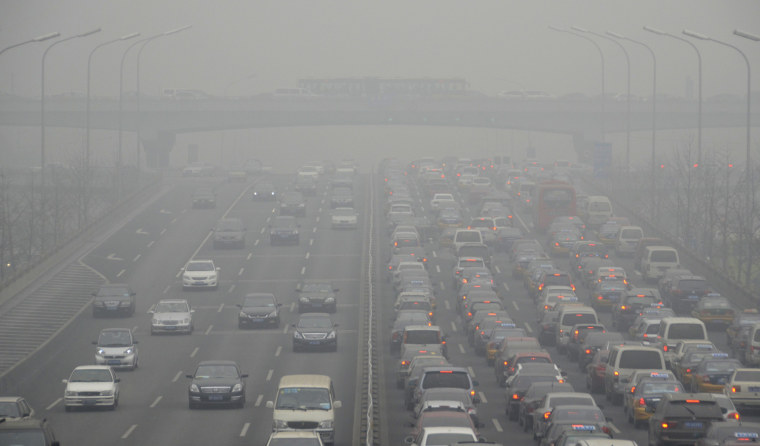China’s smog-choked cities are taking steps to control air pollution -- by restricting new car sales.
Auto industry officials have expressed concerns about such caps, but in a country with more than 200 cities with populations of more than 1 million, manufacturers don’t believe this will prove a major problem to their businesses.
Suffering some of the worst smog ever in recent months, Beijing has already temporarily closed some of the capital’s traffic-packed freeways. Now, regulators will reduce the quota on the number of new cars residents can buy next year by 40 percent -- with the rules favoring electric vehicles and other “green” technologies.
China has become the world’s largest automotive market, with sales expected to top 17 million this year – roughly two million more vehicles than in the U.S. But that surge has been linked to the country’s worsening air pollution problem.
Beijing was one of the first Chinese cities to restrict motor vehicles sales, along with the country’s other major urban center, Shanghai and two other cities. But several more, such as Chengdu, are also enacting quotas designed to slow the pace of growth of the automotive fleet.
In a recent interview, Ford Executive Vice President Joe Hinrichs, until recently the head of the maker’s Asia/Pacific operations, indicated Ford is simply shifting more of its emphasis to other regional markets, especially in central and western China where the government has been encouraging rapid regional development. Volvo, General Motors, Nissan and Volkswagen officials have also said that the real growth in China will shift to newly emerging cities in the years ahead.
Beijing, which saw the first burst of activity in China’s booming automotive market, already has limited the number of vehicles that can be registered in the city to 240,000 annually. But according to the Beijing government website, that will now be slashed to just 150,000 annually. As Reuters news service noted, there would be fewer cars registered over the next four years – just 600,000, than were added to the city’s fleet in 2010 alone, before caps were put in place.
(Read also: Toyota Concept Offers Athletes a Mobile Shower)
Beijing recently closed some of its freeways in an effort to reduce traffic and limit vehicle emissions. Meanwhile, the industrial city of Harbin, with a population of 11 million, had to shut down much of its manufacturing and other activities when pollution levels reached crisis level.
Skeptics warn that all these restrictions will do is reduce the growth of an already huge vehicle fleet that has created numerous problems for Beijing and other cities, including now-endemic traffic jams, as well as worsening smog problems.
But while Beijing is reducing overall vehicle sales, the capital city will triple the number of license plates available for alternative propulsion, such as the electric vehicles manufactured by local Chinese manufacturer BYD. The total will rise from 20,000 in 2014 to 60,000 in 2017 – or 40 percent of the total vehicles the city will allow.
China has laid out a goal of becoming the world’s largest electric vehicle market, though sales of such vehicles have lagged expectations – in part due to concerns about cost and range, as well as the ability for urban residents, who generally live in large apartment blocks, to find a place to charge up.
